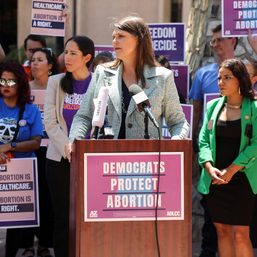SUMMARY
This is AI generated summarization, which may have errors. For context, always refer to the full article.
![[Two Pronged] First-time sex and pregnancy](https://www.rappler.com/tachyon/2021/08/two-pronged-sq-august-22.jpg)
Rappler’s Life and Style section runs an advice column by couple Jeremy Baer and clinical psychologist Dr Margarita Holmes.
Jeremy has a master’s degree in law from Oxford University. A banker of 37 years who worked in 3 continents, he has been training with Dr Holmes for the last 10 years as co-lecturer and, occasionally, as co-therapist, especially with clients whose financial concerns intrude into their daily lives
Together, they have written two books: Love Triangles: Understanding the Macho-Mistress Mentality and Imported Love: Filipino-Foreign Liaisons.
Hi Dr Holmes and Mr Baer,
Good afternoon!
I have been your avid reader. I love how precise and frank you answer questions. This is my first time to ask you and I hope you can help me with my queries.
So, here’s my question, doc. I had sex for the first time at 30. Yes, I am already 30 and never had an experience before. Is there a big chance for me to get pregnant? If not, what are the things that I need to do to avoid an unexpected pregnancy?
Thank you and more power,
G
Dear G,
In an age where women are often having children later in life both because they can now plan their pregnancies and because, for example, they first want to establish themselves in the workplace before taking a time out to start a family, becoming pregnant in your 30’s, even 40’s, is far more common than it used to be.
Is there a big chance of getting pregnant in your 30’s? Yes. Fertility may be less than in your 20’s, but probably not much less. And just look around at the mothers who must have been over 30 when the children were born. Of course there are many factors that influence conception and your gynecologist can give you chapter and verse on this.
As for birth control, the most effective form is abstinence but that is probably not the answer you are looking for. The pill, the IUD, the condom are just some of the alternatives though again your gynecologist is best placed to advise you. Make sure in advance, however, that he or she is open to a frank discussion of these matters unless you want to run the risk that your biology lesson is heavily infused with religion and end up hearing about natural birth control (as the joke goes: what do you call a couple who practice natural birth control? Parents!).
All the best,
JAF Baer
Dear G,
Thank you very much for your letter. I have been trying to suss out if I could respond to a need deeper than information on pregnancy, but decided I could not for fear of being presumptuous.
So… to answer your two questions:
“Is there a big chance for me to get pregnant if I had my first sex at 30?”
If age were the only factor in the equation (and did not include gynecological issues, etc) then yes, there is definitely a chance to get pregnant. If, however, you want to know the probability of getting pregnant in your thirties vis a vis getting pregnant at an earlier (or later) age, according to the Southern California Center for Reproductive Medicine, “a woman in her 20’s has a 20 to 25 percent chance of conceiving naturally during each menstrual cycle. Women in their early 30s have about a 15 percent chance per cycle. After 35, it slips to 10 percent, and after 40, it’s just 5 percent”
What are the ways to avoid unwanted pregnancies?
In addition to what Mr Baer has said, this is a wonderful resource because, among other things, this Planned Parenthood resource not only tells you that both the birth control patch (which you replace weekly) and the birth control pill (which you take daily) are both 91% effective, but why this is so.
Mr Baer is correct in saying abstinence is 100% effective; but I am happy to report that there is yet another method considered effective: outercourse.
However, in some communities, outercourse is considered the same as abstinence. This is in communities where it is used to describe any type of sexual act that doesn’t involve vaginal penetration and thus carries no risk of pregnancy.
It is also true that some people (like myself) use the word abstinence to mean no sexual interaction at all. But other people also use the word abstinence for anything that can’t get you pregnant, including anal and/or oral sex.
Perhaps I am being an old fogey, but somehow oral and/or anal sex hardly sound like abstinence to me.
I hope we’ve answered all the questions you wanted answered, dearest G, but just in case we haven’t, or you think of new ones in the future, please don’t hesitate to write us once more.
All the best,
MG Holmes
– Rappler.com
Need advice from our Two Pronged duo? Email twopronged@rappler.com with subject heading TWO PRONGED. Unfortunately, the volume of correspondence precludes a personal response.
Add a comment
How does this make you feel?





There are no comments yet. Add your comment to start the conversation.